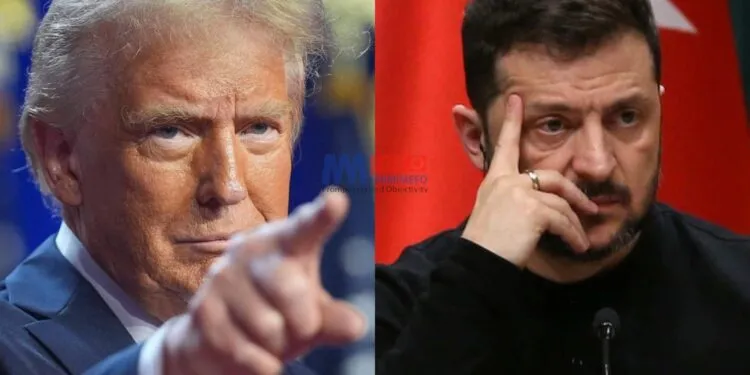U.S. President Donald Trump has made some controversial comments, appearing to blame Ukraine for the ongoing war with Russia. This comes after Ukrainian President Volodymyr Zelensky’s reaction to being excluded from recent peace talks in Saudi Arabia.
Zelensky expressed “surprise” that Ukraine was not invited to discussions in Riyadh, which saw U.S. and Russian officials meet for the first high-level talks since Russia’s full-scale invasion of Ukraine nearly three years ago. Speaking at his Mar-a-Lago residence, Trump dismissed Ukraine’s frustration and suggested the war could have been avoided.
“I hear that they’re upset about not having a seat. Well, they’ve had a seat for three years and a long time before that. This could have been settled very easily,” Trump said.
He went further, directly attributing responsibility to Ukraine: “You should have never started it. You could have made a deal.” Trump claimed he personally could have secured a settlement that would have “given them almost all of the land, everything, almost all of the land – and no people would have been killed, and no city would have been demolished.”
Trump’s Unilateral Approach to Peace Talks
Tuesday’s talks in Riyadh brought together Russian Foreign Minister Sergey Lavrov and U.S. Secretary of State Marco Rubio, marking a significant shift in U.S. foreign policy. The meeting reversed the firm pro-Ukraine stance of Trump’s predecessor, Joe Biden, and sidelined European NATO allies who have remained committed to supporting Ukraine.
Lavrov made clear that Russia would reject any peacekeeping forces from NATO countries in Ukraine, a proposal discussed at a separate European NATO meeting in Paris. European leaders, increasingly concerned over Trump’s unilateral approach, have struggled to form a unified strategy.
Following the talks, Trump declared himself “much more confident” about a resolution. “They were very good,” he said of the Russian delegation. “Russia wants to do something. They want to stop the sav8ge barbarianism.”
Trump also dismissed concerns about the lack of elections in Ukraine, echoing Russian demands for a new vote. “They want a seat at the table, but… wouldn’t the people of Ukraine have a say? It’s been a long time since we’ve had an election,” he said, falsely claiming that Zelensky’s approval rating had plummeted to “4%.” In reality, a December poll suggested that 52% of Ukrainians trust Zelensky.
Divisions Among European Leaders
European NATO members, caught off guard by the sudden U.S.-Russia negotiations, met in Paris but failed to reach consensus. German Chancellor Olaf Scholz dismissed any immediate plans to send European troops to Ukraine, calling the idea “completely premature.” Polish Prime Minister Donald Tusk ruled out deploying forces, while Italian Prime Minister Giorgia Meloni expressed scepticism, arguing it would be “the most complex and the least effective” means of securing peace.
British Prime Minister Sir Keir Starmer, however, insisted that any peace deal must include a “U.S. backstop” to deter future Russian aggression. He plans to discuss key elements of such a deal with Trump in Washington next week.
Ukraine Left Out of the Process
Zelensky, visibly disheartened during a news conference in Turkey, condemned the Riyadh meeting. “We want everything to be fair and so that nobody decides anything behind our back,” he said. “You cannot make decisions without Ukraine on how to end the war in Ukraine.”
Despite Ukraine’s absence, Rubio insisted that “no one is being sidelined,” adding, “Everyone involved in that conflict has to be OK with it. It has to be acceptable to them.”
For Ukraine, the reality remains grim. With its military struggling against Russia’s sustained offensive and growing uncertainty over Western support, Zelensky faces the daunting challenge of keeping his nation’s interests at the forefront of negotiations—negotiations that, for now, appear to be happening without him.



